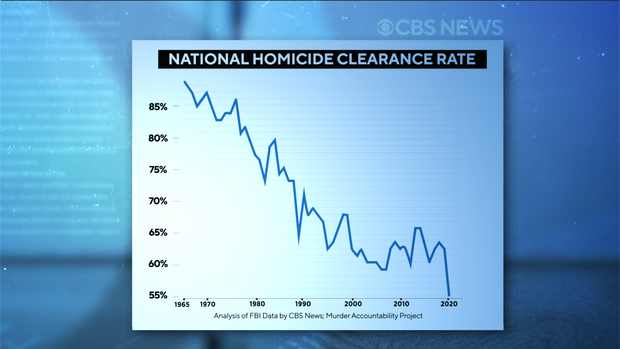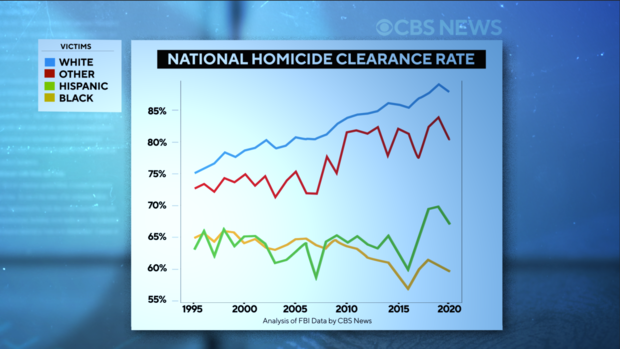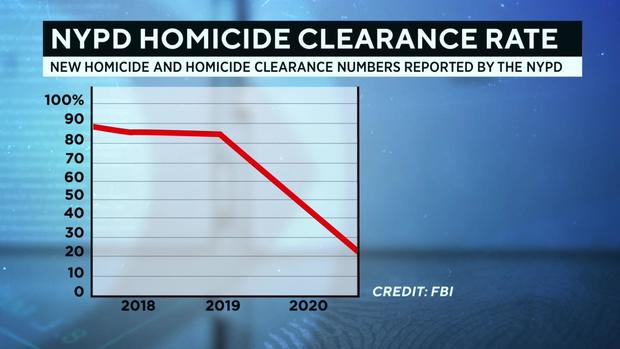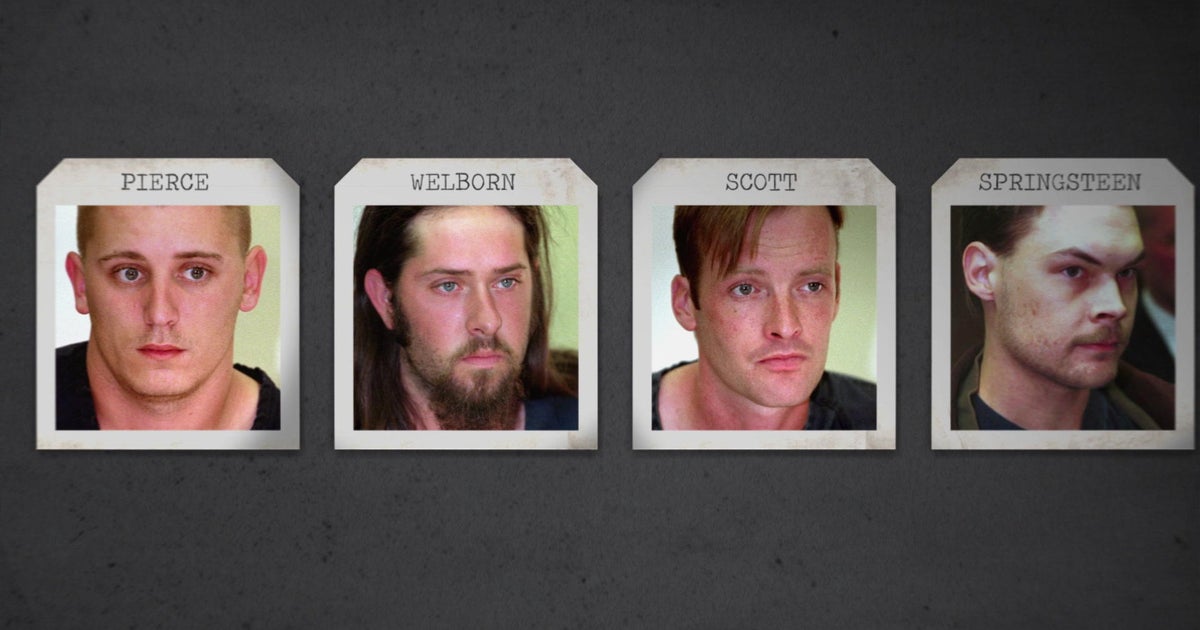A closer look at disparities in NYPD's homicide clearance rates: "It made me feel like they didn't care"
NEW YORK -- In a collaboration with CBS News, we examine a crime often going without punishment in our country.
Barely half of murder cases in the United States get solved. The national homicide clearance rate is at an all-time low, according to FBI data.
In the mid-1960s, more than ninety percent of murders were solved, generally resulting in an arrest. By 1990, the percentage fell into the sixties. Then, by 2020—as the number of homicides surged—the national clearance rate dropped to about 50 percent for the first time ever.
And our analysis with CBS News also discovered a difference by race. The national homicide clearance rate for White victims keeps improving. That's the blue line at top. Meanwhile, the rate of solving murders for Black and Hispanic victims is much lower. Those are the two lines at the bottom.
So we wanted to know what's happening locally.
As CBS2's Ali Bauman reports, Novella Harris' Brooklyn home is covered with photos of her daughter, Renee.
"She was happy," Novella Harris told Bauman.
In December 2020, Renee Harris was found shot to death in the hallway of her Queens apartment building. She was 54.
"We figured they had cameras," her brother, Kelly Harris, said. "So you figure it's a matter of time before they catch who did it. But last thing they said was we have to be able to prove it. We just can't prove it, because it happened in the stairwell, there's no cameras in the stairwell."
Now 18 months later, the NYPD still has not made any arrests, and the Harris family has lost hope.
"I don't believe that case is being worked on now, no," said Kelly Harris. "Two years later, that's in the cold files."
"It made me feel like they didn't care, because it wasn't their family," Novella Harris added.
There are many families like them.
In 2020, amid the pandemic, homicides spiked across the country, including here in New York City, while homicide arrests plummeted.
"Were people getting away with murder?" Bauman asked NYPD Chief of Detectives James Essig.
"Between members out sick with COVID, being stretched with details and unrest, and then the increase in violence, you see a pretty substantial reduction in our clearance rates in homicides," he replied.
"Clearance rate" means the percentage of cases police resolve in a given year.
According to FBI data, the NYPD's homicide clearance rate went from 86% in 2019 to 27% in 2020. However, the NYPD refutes those numbers.
"Why do you think the FBI would have different numbers then?" Bauman asked.
"I don't know, I'd have to check on the reporting. But we're at 62% in 2020, we went up to 75% last year, and we're close to 80% this year," Essig replied.
Essig later told Bauman the department is in the process of updating its computer system and, in the meantime, cannot send the correct numbers to the FBI.
While data shows the NYPD's clearance rate is now improving, there is still a backlog from 2020.
"What do you say to those families who, in some cases, feel forgotten?" Bauman asked.
"We in the New York City Police Department in the detective bureau never stop working that homicide case. Some of them are in depth investigations," Essig replied. "We have to piece together every bit of evidence, and it takes a while."
Essig said detectives need more evidence now than ever before to make a homicide arrest.
"The district attorneys want more evidence," he said. "Whether it's video, forensics, ballistics, eyewitnesses, we run the gamut of closing homicides. But the amount of time, effort and evidence gathered for homicides has definitely went up."
According to data obtained and analyzed by CBS News, the national homicide clearance rate has been improving for cases involving white victims, but falling for Black and Hispanic murder victims.
The NYPD's clearance rate has been significantly higher for white murder victims over the last decade -- most recently, at 84% for white victims, compared to 61% for Hispanic victims and 53% for Black victims during that same year.
"Every homicide is investigated," said Essig. "What I do see, our harder investigations in homicides are gang and narcotics investigations, street gangs... I don't think we look at race in terms of homicide investigation. We put all our resources into that homicide."
"Do you think the NYPD or detective unit needs more diversity to get that rate closer together?" Bauman asked.
"I think we're a majority minority police department and I have detectives of every race, ethnicity out there," Essig replied.
Department-wide, that is true. But according to NYPD data, more than half of its detectives are white.
While detectives collaborate on investigations, the NYPD has seen a rise in retirements and resignations since 2020.
"Is that affecting the homicide investigations?" Bauman asked.
"You can't replace experience, that's tough. But some of our younger officers... They're very good, very young, which means they're very tech savvy, which we need that kind of experience to solve homicides," Essig replied.
Back in Brooklyn, the Harris family says they haven't heard from a detective in at least a year. Kelly Harris believes the lack of closure is speeding up his mother's dementia.
"I think it would bring my mom a lot more peace with an arrest, because every other day she asks. I wish the detective would call us, or I need to go down to the precinct," he told Bauman. "All we're asking for is answers."
Bauman asked the chief of detectives about the Harris case. He said detectives are continuing to work on theirs and cases like it, and detectives should have been reaching back out to the family on a monthly or at least yearly basis.
Complete coverage of "Crime Without Punishment" from our CBS stations across the country and CBS News is available here.












